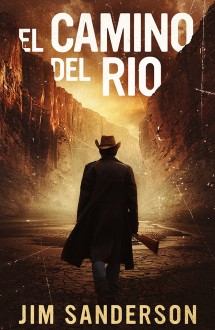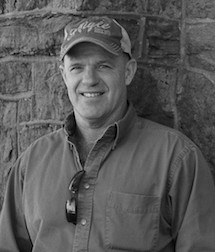Sanderson's El Camino del Rio tapped by Brash Books
When LU professor and chair of the Department of English and Modern Languages Jim Sanderson began writing his novel “El Camino del Rio” more than 20 years ago, he never anticipated the extent of the Texas-based book’s popularity. The novel was first published by the University of New Mexico for winning the Frank Waters contest as the “best book about the rural southwest.” After subsequent praise from The Washington Post and The New York Times, the novel has been selected in 2016 for republication in paperback and eBook by Brash Books.
 “This isn’t the USA, this isn’t Mexico— this is the border,” quotes Sanderson, describing his “Lit Grit” style. His inspiration for El Camino began with his trips to Big Bend area and his conversations with border patrol agents. Sanderson observed the distinct culture of west Texas— tough, unpolished, and heavily influenced by Hispanic traditions— and saw the unique environment as fodder for writing a novel.
“This isn’t the USA, this isn’t Mexico— this is the border,” quotes Sanderson, describing his “Lit Grit” style. His inspiration for El Camino began with his trips to Big Bend area and his conversations with border patrol agents. Sanderson observed the distinct culture of west Texas— tough, unpolished, and heavily influenced by Hispanic traditions— and saw the unique environment as fodder for writing a novel.
“There’s a saying in Big Bend: Everyone living there is either an outlaw running from the government or working for the government,” Sanderson said.
“El Camino del Rio” follows Dolph Martinez, a border patrol agent, through his interactions with illegal immigrants, drug smugglers, and gunrunners. When he discovers a suspicious murder, his search for the culprit leads him to diverse characters and through the mysterious presence of Hispanic folklore.
Sanderson is the author of seven acclaimed novels, including “El Camino del Rio” and “La Mordida,” both featuring US Border Patrol Officer Dolph Martinez.
His many other works include two award-winning collections of short stories: “Semi-Private Rooms,” which won the 1992 Kenneth Patton Prize, and “Faded Love,” which was nominated for Texas Institutions of Letters’ 2010 Jesse Jones award for best book written about Texas or by a Texan.
Though Sanderson categorizes his work under literary realism, “El Camino del Rio” appeals to various audiences. The University of New Mexico labeled it as mystery during its first publication, and now Brash Books, who’s motto is: “we publish the best crime novels in existence,” adds crime to the list.
Brash Books offers new opportunities for Sanderson’s work because the company is well adapted to the modern public, publicizing mainly through social media such as Facebook, Skype, and YouTube. The company is considering Sanderson’s “La Mordida” for republication and will consider the other novels in the series if they are successful.
 “He’s such a versatile author that during the course of his career he has been characterized as a ‘working class, Texas writer,’ a ‘rural Southwestern literary writer,’ a ‘western writer,’ and a ‘literary mystery writer.’ We think ‘a great writer’ pretty much sums him up,” Brash Books editors said on their website.
“He’s such a versatile author that during the course of his career he has been characterized as a ‘working class, Texas writer,’ a ‘rural Southwestern literary writer,’ a ‘western writer,’ and a ‘literary mystery writer.’ We think ‘a great writer’ pretty much sums him up,” Brash Books editors said on their website.
Sanderson is waiting to see what happens to his work currently in circulation, and he hopes to find time to write more. “I’d like to work on some facetious essays, and I have some more novels in mind, but being a department chair takes up a lot of time,” he said.
He feels his experience as an author is valuable in his primary job of teaching fiction writing because he has faced and overcome the same obstacles that his students encounter. Writing a west Texas novel, Sanderson is challenged to expand his knowledge of language to include “Spanglish.”
“It’s very Tex-Mex. I couldn’t use Google Translate; I had to go around and ask different people how to say certain phrases. What has meaning in a Tex-Mex way may not translate well even in Spanish OR English,” he said.


